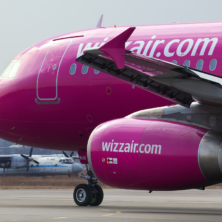Wizzair’s decision to close its subsidiary in Ukraine and move one of its Kyiv-based aircraft out of the country is not entirely unexpected. With Ukraine finding itselfin a middle of a war, its currency depreciated and two once busy airports (Donetsk and Simferopil) out of commission, it is difficult to expect an increase in demand for international air travel. The new Ukrainian government has to learn certain lessons from this situation, before it is too late.
Wizzair’s decision to close its subsidiary in Ukraine and move one of its Kyiv-based aircraft out of the country is not entirely unexpected. With Ukraine finding itselfin a middle of a war, its currency depreciated and two once busy airports (Donetsk and Simferopil) out of commission, it is difficult to expect an increase in demand for international air travel. To add insult to injury, visa-free travel to the EU appears to remain as distant a possibility for Ukrainians as ever. It is also not uncommon for the point-to-point carriers such as Wizz Air to quickly adjust their networks by moving aircraft between bases – Ryanair does this regularly, sometimes supplementing its downsizing with rambling about high airport charges.
At the same time, Wizz Air itself noted that its decision was in part precipitated by the uncertain regulatory environment in Ukrainian aviation sector. This is the message Ukrainian government should take seriously, since companies considering investing into Ukraine’s economy are certainly taking note of what Wizz Air is doing and saying.
The issue in point is the new rules for designation of Ukrainian air carriers, considered by the Ukrainian government last autumn. By linking the likelihood of obtaining such designation to the airline’s size and domestic network, such rules clearly favoured Ukraine International Airlines over any other operator. While the new regulation was suspended, it was not revoked, and the legal battle over the rules for airline designation to serve international routes is still ongoing. Clearly, the likelihood of discriminatory regulations coming into force was too high for Wizz Air to remain on the market.
The new Ukrainian government has to learn certain lessons from this situation, before it is too late. If it wants to establish itself as the government interested in creating a business friendly environment, it must abandon any thought of even considering rules that would favour certain companies over others. Unless and until a level playing field is created; unless and until a firm’s success, in whatever market, is determined solely by how well the firm is run and not by how well its owners or managers are connected to the “right” people, the country might as well abandon any hope for growth and prosperity. Investors are not dumb – quite to the contrary – and will know discriminatory regulation when they see it. And as example of Wizz Air shows, they may respond by taking their business elsewhere. Wizz Air will move one of its Kyiv-based aircraft to Slovakia – a country that is part of the single EU airline market. That market features no entry barriers to carriers capable of meeting aviation safety standards, and as a result is fiercely competitive. Wizz Air thus prefers to compete on a level playing field instead of enjoying protection from competition in an uncertain environment.
If Ukrainian government wants Wizz Air to reverse its decision and stay here, the best thing it can do is quickly and decisively adopt non-discriminatory regulation, which would allow any air carrier meeting safety and consumer protection standards and wishing to fly internationally from Ukraine to do so. Such rules must actually be adopted regardless of whether Wizz Air leaves or stays – this will be a clear signal that the new government is indeed committed to reforming the country’s economy. The government might actually need to do more than just that – the very fact that the discriminatory rules have been seriously considered and not scrapped last autumn in response to the popular uproar has put a stain on the government’s reputation.
Generally speaking, the main role of a government in the airline industry involves enforcing the aviation safety regulations. Examples of deregulated markets throughout the world show that competitive forces can rather well do the rest. Ukrainian authorities, however, have one more important task they seem to have neglected up to now – or at least they have not informed the public if anything was done. Following the illegal annexation of Crimea, Russian airline companies continue flying into Simferopil airport, in direct violation of the Eurocontrol directive and the Chicago Convention. The Ukrainian government must relentlessly put pressure on ICAO, Eurocontrol, and other relevant international organisations to make sure the Russian carriers are punished for their actions.
Attention
The author doesn`t work for, consult to, own shares in or receive funding from any company or organization that would benefit from this article, and have no relevant affiliations




